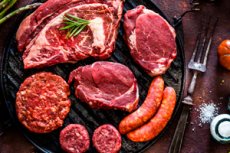New publications
Animal fats accelerate tumor growth, while plant fats do not
Last reviewed: 03.08.2025

All iLive content is medically reviewed or fact checked to ensure as much factual accuracy as possible.
We have strict sourcing guidelines and only link to reputable media sites, academic research institutions and, whenever possible, medically peer reviewed studies. Note that the numbers in parentheses ([1], [2], etc.) are clickable links to these studies.
If you feel that any of our content is inaccurate, out-of-date, or otherwise questionable, please select it and press Ctrl + Enter.

Obesity increases the risk of at least 13 major cancers, including breast, colon and liver cancers. It also weakens the tumor-killing immune responses stimulated by cancer immunotherapies. But it has long been unclear whether these effects are caused by the fat mass in obese people themselves or by the specific dietary fats they consume.
Now, a decade-long study led by Lydia Lynch of Princeton University's Ludwig Institute, published in the current issue of Nature Metabolism, has provided a compelling answer to that question.
“Our study shows that the source of dietary fat, rather than fat mass itself, is the major factor influencing tumor growth in obese mice,” Lynch said. “We found that a high-fat diet based on lard, beef tallow, or butter weakened antitumor immunity and accelerated tumor growth in several tumor models in obese mice. However, diets based on coconut oil, palm oil, or olive oil had no such effect in similarly obese mice. Our findings have implications for cancer prevention and care in humans with obesity.”
Lynch and her colleagues — including Marcia Higis, the study’s senior author and a member of Harvard’s Ludwig Center — note that replacing animal fats with plant fats may be a beneficial dietary intervention for obese patients undergoing cancer treatment. Such dietary changes could also potentially reduce the risk of cancer in obese people.
Lynch, Haigis and others have previously shown that obesity causes changes in the immune system and the tumor microenvironment that promote tumor progression. It does this by weakening the body’s immune surveillance system, which reduces the ability of immune cells — specifically cytotoxic T cells (CTLs) and natural killer (NK) cells — to infiltrate tumors and, once there, kill cancer cells.
In the current study, Lynch and her colleagues went further. They elucidated the mechanisms by which metabolites of dietary animal fats suppress NK cells and CTLs. They also showed that this immune dysfunction accelerates tumor progression in obese mice—an effect that was not observed in obese mice fed plant fats. In fact, a palm oil-based diet actually enhanced antitumor immunity and slowed tumor growth in obese mice.
The researchers identified several metabolic intermediates in dietary fats, particularly long-chain acicarnitine compounds, that potently suppress NK cells and CTLs. These metabolites were particularly elevated in obese mice fed a diet containing butter, lard, and beef tallow, but not in obese mice fed a diet containing plant fats. They report that in CTLs, these molecules cause severe metabolic dysfunction in mitochondria, the powerhouses of cells, by impairing their cytotoxic function. This renders anti-tumor CTLs incapable of survival, impairs their production of an important functional factor (interferon-γ, IFN-γ), and disables their cell-killing machinery.
A palm oil diet, on the other hand, prevented metabolic “paralysis” in NK cells from obese mice, apparently by boosting the activity of a key regulator of cellular metabolism, the c-Myc protein. The scientists found that Myc gene expression was reduced in mice fed animal fats, as well as in NK cells taken from obese people.
“These results highlight the importance of diet in maintaining a healthy immune system,” Lynch said. “More importantly, they show that altering the fat component of the diet can improve cancer treatment outcomes in obese people and should be clinically evaluated as a potential dietary intervention for these patients.”
